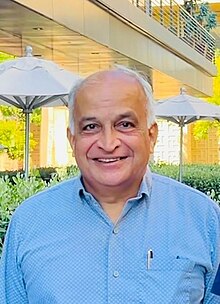Jayant B. Udgaonkar | |
|---|---|
Jayanta Udgāṁvakara | |
 | |
| Born | March 22, 1960 Maharashtra |
| Education | IIT Madras (MSc) Cornell University (PhD) |
| Alma mater | St. Xavier's College, Mumbai (BSc) |
| Organization(s) | National Centre for Biological Sciences, IISER Pune |
| Known for | Protein-folding |
| Website | sites |
Jayant Bhalchandra Udgaonkar (Marathi : Jayanta Udgāṁvakarapronounced [dʒəjənt̪ᵊtʃən̪d̪ɾəud̪əɡaʊ̃kəɾᵊ] ) is a molecular biologist studying the processes by which a random chain of amino acids stabilises into a functional structure during or after translation. [1] [2]